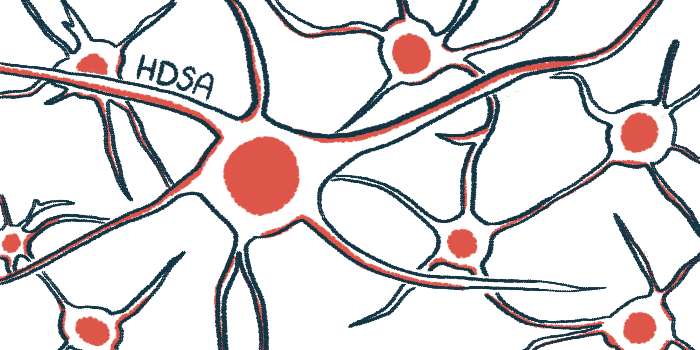HDSA 2025: Early planning key for navigating care over time
Conversations about directives, future wishes important, speakers say
Written by |

Taking steps to plan ahead, including having difficult discussions early on, can help people with Huntington’s disease and their families navigate life as the disease progresses and care needs evolve.
That’s according to speakers at the Huntington’s Disease Society of America (HDSA) annual convention, held June 26-28 in Indianapolis. Courtney Gatza, a social worker at Indiana University’s HDSA Center of Excellence, and Christopher James, MD, a neurologist at Indiana University School of Medicine, offered strategies for managing care needs throughout the stages of Huntington’s progression in a talk, “Managing Changing Care Needs Over Time.”
Communication is key with Huntington’s, Gatza and James said.
The progressive disorder causes a variety of Huntington’s symptoms, including movement disorders, cognitive problems, and psychiatric disturbances, that tend to get worse over time.
In the early Huntington’s stages, care focuses in large part on creating routines to set the person up for future success. This can include getting into an exercise routine to build muscle mass and creating a structured environment and consistent schedule to make the disease easier to navigate even with cognitive challenges. Early treatment may include approved medications for chorea (the involuntary, jerky movements that are a hallmark of Huntington’s) or antidepressants and anti-anxiety medications for mental health issues.
Improving life quality, making future plans
Huntington’s medications are aimed at “trying to improve the quality of life” for patients, said James.
“As of now … we don’t have a drug available to slow down the progression of Huntington’s,” James said. “Just because there’s [U.S.] approval of a medication for a [Huntington’s symptom] does not mean that that person should be getting that medication.”
For example, “some folks are really bothered by their [movement disorders],” he said. “And if that’s the case, we start something. If they’re not bothered by it or if it’s not significant enough … then we let it be.”
A major goal for early in the disease course is creating plans for the future, the speakers said.
“It can be extremely hard to talk about these things in this stage, because life can still feel and look pretty normal,” Gatza said, but “conversations about advance directives, living wills and legal planning is something that we can all benefit from, regardless of our risk for Huntington’s disease.”
Talking about the future “helps make decisions easier when things evolve,” she said. “These are conversations that families find a lot of value in.”
Care planning pays off as disease enters middle stages
In middle-stage Huntington’s, chorea tends to become more severe, and patients start having problems with balance and speaking. This is when physical, occupational, and speech therapy become more important, Gatza said.
“As we get into mid stages when lifestyle and routines at home are starting to change … this is really where those early habits can be really beneficial for families,” Gatza said.
Patients often become impulsive and dwell fixedly on specific ideas, and psychiatric issues like irritability, compulsive behaviors, and apathy are common. These issues can set the stage for conflict between patients and their loved ones.
James and Gatza said it’s important for caregivers and family members to pick their battles, trying not to make a big deal out of issues like personal hygiene, as long as the patient is safe.
Still, James, said it can be helpful to “gently nag,” encouraging people with Huntington’s to get out and participate in activities that they can enjoy.
Gatza said it can be helpful to bring in more “neutral” people so that these gentle nags aren’t coming solely from the spouse or “that one family member that’s always telling us what to do.”
Support groups are important for caregivers at all stages of the disease, “but definitely during these times when you know the function at home is changing, somebody is no longer working and now spending all of their time at home,” she said.
Palliative care can be ‘bridge’ in later stages
As Huntington’s moves into the later stages, chorea tends to become less of an issue, and balance, speech, and swallowing difficulties become worse. At this point, medications for motor issues are less of a priority than physical, occupational, and speech therapy and finding adaptive strategies like using a walker or wheelchair, said James.
People with late-stage Huntington’s often struggle communicating. James said it’s important to give patient ample time to express themselves so that they can be understood.
Hallucinations (seeing or hearing things that aren’t there) and delusions (fixed beliefs with no basis in reality) also become common in late-stage Huntington’s. Medications may help with these issues, said James, noting that it’s important for family members and caregivers not to invite conflict by confronting or dismissing these experiences unless there’s a risk to the patient’s safety.
“If you don’t know whether to confront it or not, be like, OK, is this a safety issue or not?” he said.
Palliative care, which focuses on improving life quality by helping to manage pain and other symptoms, is often helpful in later stages of Huntington’s, the speakers said.
“I think palliative care is a helpful tool to kind of bridge the gap between managing things fine on our own, to kind of the end stages where we … think about hospice,” Gatza said.
As people with Huntington’s near the end of their lives, the steps taken earlier to plan ahead will pay off, said Gatza.
“In the later stages, this is where we can kind of find comfort in knowing that we’ve had the harder conversations early on, and we kind of lean on what we know our loved one has articulated to us about what they want,” she said.
Note: The Huntington’s Disease News team is providing virtual coverage of the Huntington’s Disease Society of America annual convention June 26-28. Go here to see the latest stories from the conference.








